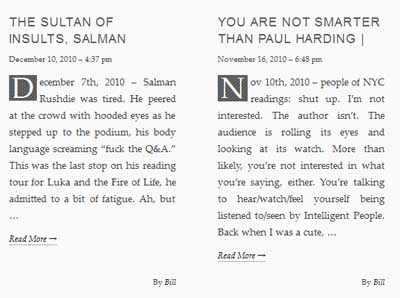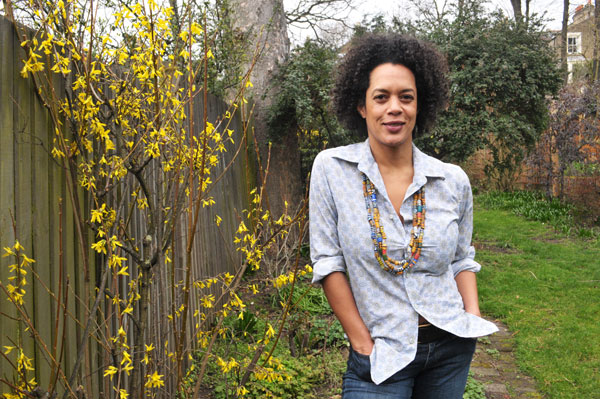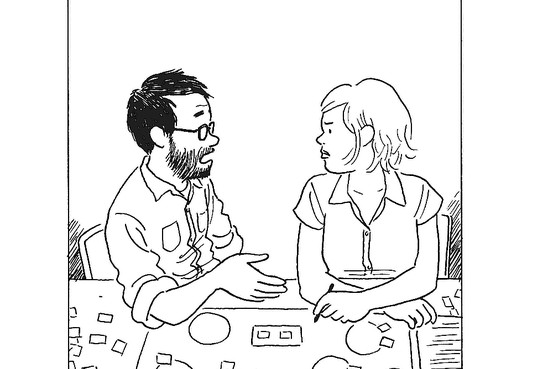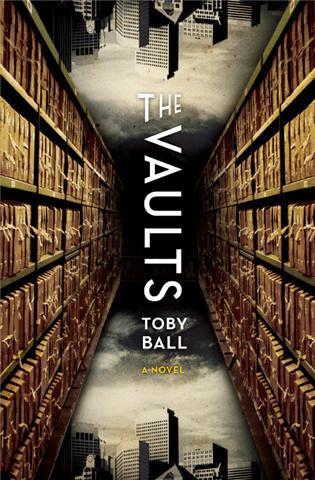Bill Ryan recently appeared on The Bat Segundo Show #384. He is the proprietor of the website Insulted by Authors.
Listen: Play in new window | Download
Condition of Mr. Segundo: Insulted by humorless people.
Guest: Bill Ryan
Subjects Discussed: Taking unexpected tumbles in life, why insults are the best way to pop the cherry of the author-reader relationship, being the son of a scientist, dodging dodgy publicists, being identified as “The Bill Plus Insult Guy,” picking away at the celebrity industrial complex that has been built up around the author, being frightened by Salman Rushdie, whether there is something inherently wrong in asking an author to insult the reader, difficulties with humorless authors, Nicole Krauss’s post-profanity titter, how the prelude to an author interaction sets up strange expectations, Rick Moody’s refusal to sign older books, book autograph prospectors, being afraid of preconceptions, taking the denial of an insult personally, when joie de vivre is mistaken as a threat, hero worship and naivete, the protective personality traits of authors, looking at the dilemma from the “why not an insult?” position, ideal readers vs. material readers, Banksy, being inclusive of quirky ideas within a marginalized medium, non-monetary value and books, and the dangers of being drawn too close to the apotheosis of fame.
EXCERPT FROM SHOW:
Ryan: Salman Rushdie was in my top four of insults I’d love to get. The Mount Rushmore of insults or whatever. I was so frightened ahead of time for some reason, despite the fact that this is a guy who’s reading a children’s book in front of a crowd of people who showed up at an art gallery. To hear someone read a children’s book. I was nervous! Because it’s Salman Rushdie. And I approached him. And I have tweaked my approach, depending upon the author. Like with Salman Rushdie, I was very deferent. “Mr. Rushdie, I’m sorry to be the kind of person to ask you this. But if you have a moment, if that’s okay, could you add an insult to my personalization?” And I’m worried almost that the fact that I’m scared, intimidated by the very thing that I kinda want to break down, is maybe a problem with my scientific approach. (laughs) Do you know what I mean?
Correspondent: Well, maybe it’s an emotional approach. Because here you have Rushdie. You hope that he will defy your expectation, that he will insult you. And what does he do? He decides, “Why do you want to do that?” And it’s sort of a big letdown. It’s almost like maybe you were nervous about setting yourself up for this letdown. Is that safe to say?
Ryan: It’s like: What did I do wrong? Okay. Exactly, yes! The scientific approach where I was waiting in line and I had everything lined up like a series of actions that I had just lined up in my mind. And I’m like, “Okay, I’m going to approach Mr. Rushdie. I’m going to set down my book. Very gently.” I’m going to say, “Mr. Rushdie, thank you very much. Blah blah blah. By the way, my name’s Bill. Insulted by Authors.” So I went back over after the fact. And for whatever reason, I got really really nervous and really excited. Just the fact that I’m disrupting whatever silly little convention that there is behind the whole signing of a book. I may be blowing it up way, way too big in my mind. But afterwards, my heart was pumping. And I was like, “Okay, what did I do wrong? What was it that Mr. Rushdie didn’t understand about….”
Correspondent: Just call him Salman. (laughs) Mr. Rushdie? He won’t appear on this program. So we can go ahead and be informal about him. If it’s any consolation.
Ryan: (laughs) So Salman. Yeah, I had to go over for the next twenty minutes. And I actually, literally, sat right outside the signing — or stood right outside the signing — and was breathing deep. And all these people.
Correspondent: Breathing deep?
Ryan: Yeah. I was breathing deep. I was actually…
Correspondent: Hope you weren’t hyperventilating.
Ryan: A little bit! A little bit, man. This is how much I put into this for whatever stupid reason. And all these people who had heard me talking to myself in line slowly filtered out around the corner. What did I do wrong? How can I perfect this asking for an insult? How can I make this more accessible to the Rushdies of the world? But also equally accessible to the AL Kennedys of the world.
Correspondent: Or the Amy Sedarises.
Ryan: Exactly. Exactly.
Correspondent: Well, on the other hand, what do you to deal with the reality that some authors — particularly the Old World, anti-online, anti-Tumblr, anti-Twitter types — they’re going to go ahead and say, “I’ll never stoop to that. Because I am an author.” Rushdie may be one of the last ones. Along with say, maybe, Richard Ford. I don’t think he would insult you.
Ryan: Probably not.
Correspondent: Philip Roth might, I think.
Ryan: I’d like to think that.
Correspondent: (laughs) I’d like to think that he would. Cynthia Ozick might, if you could get her.
Ryan: Yes!
Correspondent: But, on the other hand, you’re dealing with a lot of self-important authors who, let’s face the facts, are humorless. So where does the challenge kick in? Is it less about trying to bump your head against the wall? And more about seeing how they will react? I mean, it was actually rather astonishing to me to learn that Allegra Goodman would refuse to insult you and that post has not gone up, I noticed.
Ryan: Not yet. Not yet. I went through a transition between — I still don’t quite know what I’m trying to do with all this. Like I’m just trying to have fun. And I’m a book collector, in general. And I treat books as objects in addition to being books. Which is somewhat tragic, I’m sure. But also — whatever. I mean, everybody has something they’re trying to change about them. But I feel like everyone would be able to give me an insult if I somehow approached them in the right way or it was the right situation. Or something. There’s all these other outline — like little things that can mess with my amazing idea, incredible idea for insults.
Correspondent: You think you can develop the perfect pretext for any situation.
Ryan: (laughs) Exactly.
The Bat Segundo Show #384: Insulted by Authors (Download MP3)



 Correspondent: I wanted to get into the ineluctable autobiographical angle through a different mechanism. Interviewers, critics — they’ve all said, “Oh, well, Tomine is totally autobiographical.” But here, you are tempting fate again with the subtitle of the book: “prenuptial memoir.”
Correspondent: I wanted to get into the ineluctable autobiographical angle through a different mechanism. Interviewers, critics — they’ve all said, “Oh, well, Tomine is totally autobiographical.” But here, you are tempting fate again with the subtitle of the book: “prenuptial memoir.”
